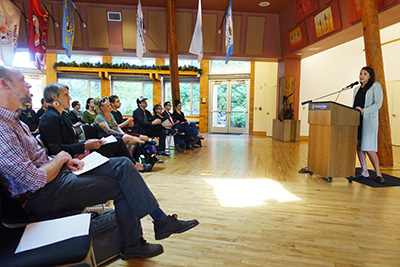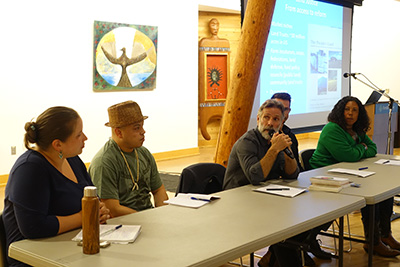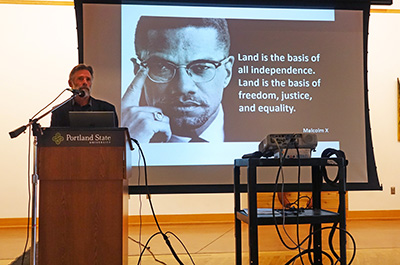Symposium Takes on Food and Land Justice
This article was originally published on Solutions Blog at Sustainability – Portland State University.
In May 2018, the Graduate Certificate in Sustainable Food Systems hosted a Symposium on Food and Land Justice. The symposium, which featured two keynote speakers and a panel of local activists and practitioners, took place over two evenings, May 9th and 16th, at PSU’s Native American Student & Community Center.
 The first night of the Symposium featured Dr. Michelle Daigle, Assistant Professor in the Department of Geography at the University of British Columbia, who gave a talk entitled, “Resurging Indigenous Geographies through Land-Based Practices”. Dr. Daigle is Mushkegowuk (Swampy Cree) and a member of the Constance Lake First Nation in northern Ontario, Canada. Her research explores “resource exploitation and gendered forms of dispossession and violence within Indigenous communities and in settler-colonial contexts,” particularly in relation to land-based practices, which include the range of food provisioning and cultural practices such as hunting, fishing, and gathering, as well as management of and access to the water and forests that support them.
The first night of the Symposium featured Dr. Michelle Daigle, Assistant Professor in the Department of Geography at the University of British Columbia, who gave a talk entitled, “Resurging Indigenous Geographies through Land-Based Practices”. Dr. Daigle is Mushkegowuk (Swampy Cree) and a member of the Constance Lake First Nation in northern Ontario, Canada. Her research explores “resource exploitation and gendered forms of dispossession and violence within Indigenous communities and in settler-colonial contexts,” particularly in relation to land-based practices, which include the range of food provisioning and cultural practices such as hunting, fishing, and gathering, as well as management of and access to the water and forests that support them.
In her lecture, Dr. Daigle drew connections between ongoing struggles to stop Kinder Morgan’s Trans-Mountain pipeline on unceded Musqueam, Squamish, and Tsleil-Waututh territory (where Vancouver, BC is located) and efforts by members of the Nichnawbe Aski Nation (which includes Constance Lake and nearly fifty other First Nations communities in northern Ontario) to protect their territorial sovereignty from mining and other extractive industries. In her talk she situated Mushkegowuk land-based practices within a “resurgence” of Indigenous sovereignty and cultural practices. During the audience question and answer session, Dr. Daigle noted that she prefers to discuss food justice within the broader context of Indigenous land-based practices, rather than specifically framing her work explicitly as “food justice” or “food sovereignty”, as such terms tend to privilege agricultural contexts over other forms of food procurement. She explained that a narrow focus on food can also shift attention away from the fundamental concern over territorial sovereignty, which impacts impacts land-based food, economic, and cultural practices.
The symposium’s second night began with a keynote address from scholar-activist Dr. Eric Holt-Giménez, Executive Director of the non-profit food justice thinktank Food First based in Oakland, California. Dr. Holt-Giménez opened his lecture by connecting the current battle over gun control with a review of the 2nd Amendment’s genesis as a means of controlling non-Europeans and ensuring settler access to land. He then expanded on the myriad ways control of land has been fundamentally linked to racial/ethnic dominance and settler colonialism in the United States and beyond. Examples he cited included the doctrine of Manifest Destiny, Jim Crow laws, Japanese-American internment, and discrimination by the United States Department of Agriculture in their lending practices. He read excerpts from the book he co-edited, Land Justice: Re-imagining Land, Food and the Commons in the United States, which features the writing of a diverse roster of practitioners and scholars working at the forefront of this national movement.
Dr. Holt-Giménez then shifted his focus to the rise of the corporate food regime in the mid-20th century, and the extensive array of policies and actions that put control of agricultural land into the lands of a small number of powerful entities, specifically the nation’s largest landowners, who collectively own over 34 million acres. He also honed in on challenges currently facing the farming industry, such as an aging workforce and its homogenous (92% white) demographic. He concluded his lecture by establishing the vital correlation between social justice and land justice.
 A panel discussion with local activists and practitioners followed the Dr. Holt-Giménez’s talk. Shantae Johnson of the organization Mudbone Grown touched on her personal connection to growing food, its healing properties, and why she and partner Arthur Shavers started the Unity Farm at the Oregon Food Bank and the state’s first beginning farmers training program explicitly geared to support People of Color. Rowan Steele of East Multnomah Soil & Water Conservation District’s Headwaters Incubator Program then talked about the support his program provides for new farmers, and the Conservation District’s role in supporting small-scale farming as a way to promote environmental stewardship and sustainability. Next, Gabe Sheoships (Cayuse and Walla Walla Nations) of Friends of Tryon Creek echoed some of what Dr. Daigle spoke on a week earlier, noting that traditional Indigenous food systems in the Pacific Northwest are based on fishing and gathering, rather than agriculture, and so discussions of food and land justice must include these, as well. He discussed initiatives by public land managers such as Metro to support Indigenous peoples’ access to First Foods, and urged participants to build deep relationship with our ecosystems. Cary Watters (Tlingit Nation) of the Native American Youth and Family Center (NAYA) rounded out the panel by discussing her organization’s incorporation of gardening into their programming, and the development of Cully Park, Portland’s newest park, which features the city’s first Native Gathering Garden. She also discussed NAYA’s involvement in the Portland Clean Energy Initiative. Dr. Holt-Giménez applauded the efforts of the four panelists, noting that they provided a hopeful counterpoint and productive vision of change to complement his dire but necessary critique of the food system and the land injustices that run through it.
A panel discussion with local activists and practitioners followed the Dr. Holt-Giménez’s talk. Shantae Johnson of the organization Mudbone Grown touched on her personal connection to growing food, its healing properties, and why she and partner Arthur Shavers started the Unity Farm at the Oregon Food Bank and the state’s first beginning farmers training program explicitly geared to support People of Color. Rowan Steele of East Multnomah Soil & Water Conservation District’s Headwaters Incubator Program then talked about the support his program provides for new farmers, and the Conservation District’s role in supporting small-scale farming as a way to promote environmental stewardship and sustainability. Next, Gabe Sheoships (Cayuse and Walla Walla Nations) of Friends of Tryon Creek echoed some of what Dr. Daigle spoke on a week earlier, noting that traditional Indigenous food systems in the Pacific Northwest are based on fishing and gathering, rather than agriculture, and so discussions of food and land justice must include these, as well. He discussed initiatives by public land managers such as Metro to support Indigenous peoples’ access to First Foods, and urged participants to build deep relationship with our ecosystems. Cary Watters (Tlingit Nation) of the Native American Youth and Family Center (NAYA) rounded out the panel by discussing her organization’s incorporation of gardening into their programming, and the development of Cully Park, Portland’s newest park, which features the city’s first Native Gathering Garden. She also discussed NAYA’s involvement in the Portland Clean Energy Initiative. Dr. Holt-Giménez applauded the efforts of the four panelists, noting that they provided a hopeful counterpoint and productive vision of change to complement his dire but necessary critique of the food system and the land injustices that run through it.
Stay in the loop with Food First!
Get our independent analysis, research, and other publications you care about to your inbox for free!
Sign up today!The leaders of the Graduate Certificate in Sustainable Food Systems hope the Symposium fostered learning and dialogue among those in attendance and provided them with inspiration and direction for long-term structural changes necessary to transform the food system, particularly around land justice. The symposium was made possible with the generous support of the Institute for Sustainable Solutions, the Toulan School of Urban Studies & Planning, the Graduate School of Education, and the Departments of Environmental Science & Management, History, and Sociology.
Professor Nathan McClintock also contributed to this blog post.


 Help Food First to continue growing an informed, transformative, and flourishing food movement.
Help Food First to continue growing an informed, transformative, and flourishing food movement.




